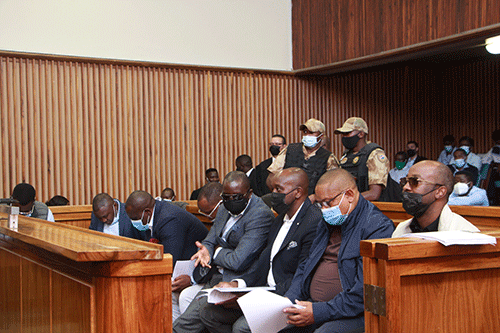Five men implicated in the Fishrot scandal are fighting tooth and nail to stop prosecutor general Martha Imalwa from attaching their assets.
In an application heard by Windhoek High Court Judge Orben Sibeya, the PG wants the court to declare a rule nisi, issued in November last year – to declare the assets, including cars, flats, erven, farms and cash forfeited to the State – as final.
Sibeya has already granted an interim property preservation order, covering an array of assets linked to the six accused in the Fishrot case, as well as to companies and close corporations connected to them.
A property preservation order is normally the first order given in legal proceedings in which the prosecutor general later asks the court to order the forfeiture of assets linked to a crime.
The parties in the restraint application by the PG are former fisheries minister Bernard Esau, former justice minister Sacky Shanghala, former managing director of Investec Asset Management James Hatuikulipi, Ricardo Gustavo, Tamson Hatuikulipi and his wife Ndapandula Hatuikulipi, as well as her mother Suama Esau.
The six Icelandic companies, whose directors are Juliusson, Adalsteinn Helgason and Egil Arnason, are also listed in the application.
In an affidavit, Imalwa alleges that Shanghala, James Hatuikulipi, Tamson Hatuikulipi, Esau and Gustavo corruptly solicited and accepted or agreed to accept payments of not less than N$115 million from Samherji in Namibia as reward for securing fishing quotas for the Icelandic fishing group – and in addition received known payments of N$54.6 million outside Namibia.
The N$54.6 million, which Imalwa said was paid into a bank account of a company of James Hatuikulipi, Tundavala Invest, in Dubai, is regarded as payments that are meant to be shared among the participants in the scheme, she states in her affidavit.
The Anti-Corruption Commission (ACC) has gathered evidence that will prove that the accused and corporate entities used by them committed corruption, fraud, tax evasion, money laundering and racketeering offences in terms of the Prevention of Organised Crime Act, Imalwa also stated.
They are part of the Fishrot scandal in which the accused allegedly benefitted from bribery to the tune of more than N$130 million.
The defendants, however, claim that the investigation carried out by the ACC was unlawful, according to the Prevention of Organised Crime Act (POCA), as it is not permitted to investigate POCA crimes.
As such, they say, the application by Imalwa is flawed and stands to be set aside.
All of them claim, through their respective lawyers, that according to the law, the inspector general of the Namibian Police (IG) had to authorise someone to investigate, which was not done in this instance.
This makes the application unlawful, they argued.
The PG, on the other hand, argues that the said section in the act upon which they rely is not set in stone and can be interpreted in different ways.
While the defendants say the IG had to authorise an investigator, the act affirms he may authorise someone – anyone for that matter – which was done in this case.
According to them, the ACC is mandated to investigate financial crimes and fraud, and then recommend prosecution to the PG.
The PG asserted should she find evidence of money laundering, she has the power to bring forfeiture applications against culprits.
Judge Sibeya reserved his judgment until 17 May 2023 at 09h00.
– rrouth@nepc.com.na



